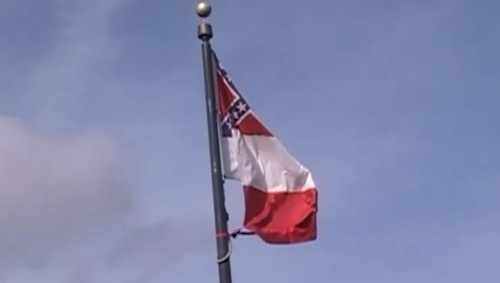
As South Carolina Republican Governor Nikki Haley moves toward a plan to remove the Confederate Battle Flag from the State House grounds, it's worth remembering another debate nearly a decade ago in Georgia, which could foreshadow the coming firestorm in the Palmetto State.
I moved to Georgia in 2001 from Washington, DC. At a small reception for my going away party, a co-worker from the South asked "So, John, how are you preparing for small-town Southern life?"
"I've been watching lots of episodes of 'In the Heat of the Night'" I replied, to laughs from the others.
But it was no laughing matter when I got to the state. Earlier that year, Governor Roy Barnes had proposed changing the state flag, scrapping the one where the Confederate Battle Flag covered 2/3 of the Georgia flag. It had been adopted in 1956, as a means of opposing integration.
"Barnes decided to make the change after he visited the governor of South Carolina in late 2000. That governor had removed the Confederate battle flag from the top of the South Carolina Capitol. Barnes saw with his own eyes the terrible impact the Confederate battle flag fight was having on that state. It was a raging controversy, with boycotts and people on both sides of the issue strongly debating each other in newspapers and other media. There were demonstrations all over the state, and African-American groups gathered at the state lines urging motorists to turn around and not enter South Carolina."
It wasn't the first time someone suggested it. Popular Governor Zell Miller tried to do so in 1993, and he only narrowly won reelection after abandoning his efforts to alter it. But Barnes took the bold step in 2001 and back then, Democrats controlled both houses of the legislature. It was quickly passed.
Not long afterwards, you started seeing Confederate Battle Flag emblems pop up all over the state, primarily in rural areas, reading "Boot Barnes." The harsh debate made it a pretty tense time. It felt like some were refighting the Civil War. Barnes was defeated over the issue in 2002.
But if Republicans coming in thought they were going to get a free pass from those who wanted the Confederate Battle Flag back, they were sorely mistaken. Sonny Perdue, the GOP candidate who campaigned against Barnes on the Confederate flag issue did remove the Barnes flag, but he adopted the 1903 state flag, which looks more like the Confederate States of America flag with the Georgia symbol, and not the very recognizable Confederate Battle Flag that you saw pop up all over the South in response to integration efforts in the 1950s and 1960s. A group dubbed the "flaggers" by the press was pretty mad.
As a result, you saw "Punt Perdue" signs with the Confederate Battle Flag, looking very much like the old "Boot Barnes" ones. In my county, there were those that said "Dump Dan Lee" and had a Confederate Battle Flag, because Lee (whose wife sings with mine in the church choir) was a state legislator and ally of Sonny Perdue. Perdue survived because the Democrats were divided at the top of the ticket, but Lee lost his seat.
That 1903 flag is still there. Though political careers were ruined over the affair, Barnes did win the John F. Kennedy "Profile in Courage" in 2003 along with South Carolina GOP Governor David Beasley, both of whom tried to remove the flags that had been misused by opportunists to reflect segregationist aims.
John A. Tures is a professor of political science at LaGrange College in LaGrange, Ga. He can be reached at jtures@lagrange.edu.

